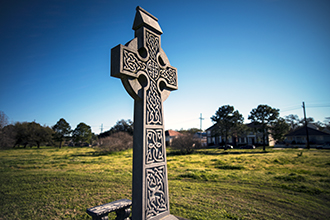Dispelling myths about New Orleans' Irish
As St. Patrick's Day approaches and we consider the Irish heritage of New Orleans, it is easy to lump together all of the people who immigrated to the city from Ireland because of what they shared language, religion and, of course, a homeland. But that would be a mistake, according to Tulane historian Terrence Fitzmorris.

A Celtic Cross in New Basin Canal Park in the Lakeview neighborhood honors the Irish immigrants who dug the New Basin Canal from 1832 to 1838. The canal stretched from what is now the Central Business District to Lake Pontchartrain. (Photo by Ryan Rivet)
Fitzmorris, who is associate dean of the School of Continuing Studies and an adjunct history professor, says that the myth, which was perpetrated by many historians, of the Irish being “degraded, demoralized and disoriented” when they arrived in New Orleans is just not the case.
“The Irish people who came to New Orleans were not monolithic nor were they homogenous,” Fitzmorris says. “They were diverse in education and class, and to paint them all with the same brush is a disservice.”
Fitzmorris argues that they may have been poor, as a result of the Irish Famine, but the idea that they were all illiterate proletarians is false, as evidenced by the fact that many found work in trades that required more than a modicum of education.
“We see many Irishmen who became clerks and the like, which required not only that they were literate, but that they were educated and skilled,” Fitzmorris says. “That certainly goes against some of the conventional truths and wisdom people have about them.”
Furthermore, Fitzmorris says, the Irish brought with them a parish-centered view of the Catholic religion, and along with that view of the church came Catholic schools, run by nuns who, he says, were “by and large Irish.”
“Because of these schools, the Irish were responsible for the expansion of education in New Orleans,” Fitzmorris says.
Another myth he wishes to dispel is that the Irish came to New Orleans and suffered more than other immigrants.
“Some mythmakers want to portray the Irish as victims,” Fitzmorris says. “They were not victims. They were actors who came here and took advantage of the American gifts.”
